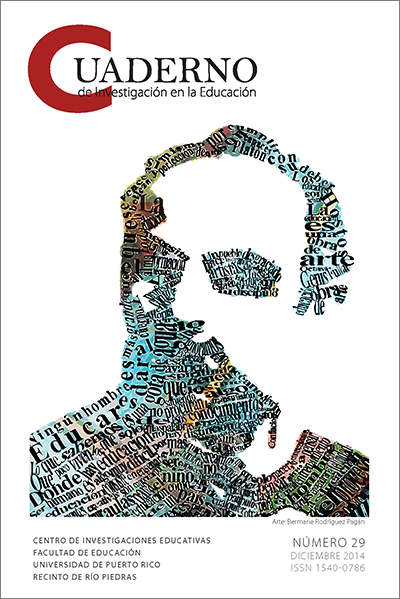Resumen
Presentación de María Torres-Guzmán en el Tercer Congreso de Revistas Académicas.
Cómo citar:
Torres-Guzmán, M. E. (2014). The knowledge hustle: A professor‘s path toward productivity. Cuaderno de Investigación en la Educación, 29, 124-143. Recuperado a partir de https://revistas.upr.edu/index.php/educacion/article/view/13259
Citas
Boise, R. (1990). Professors as writers: A self-help guide to productive writing. Stillwater, OK: New Forums Press.
Boyer, E. (1991). The scholarship of teaching from: Scholarship reconsidered: Priorities of the professoriate. College Teaching, 39(1): 11-13.
Butler, J. (1993). Bodies that matter: On the discursive limits of sex. NY: Routledge.
Butler, J. (1997). Excitable s.peech: A politics of the performative. East Sussex, UK: Psychology Press.
Butler, J. (2004). Undoing gender. New York: Routledge.
Calderón, D., Delgado-Bernal, D., Peréz Huber, L., Malagón, M. C. & Vélez, V. N. (2012). A Chicana feminist epistemology revisited. Harvard Educational Review, 82(4), 513-539.
Castillo-Montoya, M. & Torres-Guzmán, M. E. (2012). Thriving in our identity and in the academy Latina epistemology as a core. Harvard Educational Review, 82(4), 513-539.
Davidov, V. V. (1990). Type of generalization in instruction: Logical and psychological problem in a structuring of school curricula. Reston: National Council of Teachers of Mathematics.
Deleuze, G. & Guatarri, F. (1983). Anti-Oedipus: Capitalism and schizophrenia (M. S Hurley & H. R. Lane, Trans.). Minneapolis: University of Minnesota Press.
Engeström, Y. (2000). From individual action to collective activity and back: Developmental work research as an interventionist methodology. In P. Luff, J. Hindmarsh, & C. Heath (Eds.), Workplace studies (pp. 150-166). Cambridge, UK: Cambridge University Press.
Engeström, Y. (2001). Expansive learning at work: Toward an activity theoretical reconceptualization. Journal of Education and Work, 14(1), 133-156.
Engeström, Y., & Sannino, A. (2011). Discursive manifestations of contradictions in organizational change efforts. Journal of Organizational Change, 24(3), 368-387.
Feak, C. B., & Swales, J. M. (2009). Telling a research story: Writing a literature review. The Michigan Series in English for Academic & Professional Purposes. Ann Arbor, MI: University of Michigan Press.
Greene, M. (1995). Releasing the imagination: Essays on education, the arts, and social change. San Francisco, CA: Jossey-Bass Publishers.
Leontev, A. N. (1981). Problems of the development of the mind. Moscow: Progress.
Mateos, M., Cuevas, I., Martín, E., Martín, A., Echeita, G., & Luna, M. (2011). Reading to write an argumentation: The role of epistemological, reading and writing beliefs. Journal of Research in Reading, 34(3), 281–297. DOI: 10.1111/j.1467-9817.2010.01437.x
Menchú, R. (1983). I, Rigoberta Menchu: An Indian woman in Guatemala (E. Burgos-Debray, Ed. & A.Wright, Trans.). London: Verso.
Nash, R. J. (2004). Liberating scholarly writing: The power of personal narrative. New York: Teachers College Press.
Neumann, A. (2009). Professing to learn: Creating tenured lives and careers in the American research university. Baltimore: The Johns Hopkins University Press.
Silvia, P. J. (2007). How to write a lot: A practical guide to productive academic writing. Washington, D. C.: American Psychological Association.
Top Research Faculty Scholarly Productivity Index. (2007). The Chronicle of Higher Education. Retrieved from http://chronicle.com/stats/productivity/page.php?year=2007&primary=7&secondary=226&bycat=Go
Villalón, R., & Mateos Sanz, M. (2009). Concepciones del alumnado de secundaria y universidad sobre la escritura académica [Secondary and university students‘ conceptions about academic writing]. Infancia y aprendizaje, 32(2), 219-232.
White, M. J., & Bruning, R. (2005). Implicit writing beliefs and their relation to writing quality. Contemporary Educational Psychology, 30(2), 166–189.
Zibrowski, E. M., Weston, W. W., & Goldsmith, M. A. (2008). 'I don‘t have time‘: Issues of fragmentation, prioritization, and motivation for education scholarship among medical faculty. Medical Education, 42(9), 872–878. DOI: 10.1111/j.1365-2923.2008.03145.x

Esta obra está bajo una licencia internacional Creative Commons Atribución-NoComercial 4.0.
Derechos de autor 2014 Cuaderno de Investigación en la Educación

